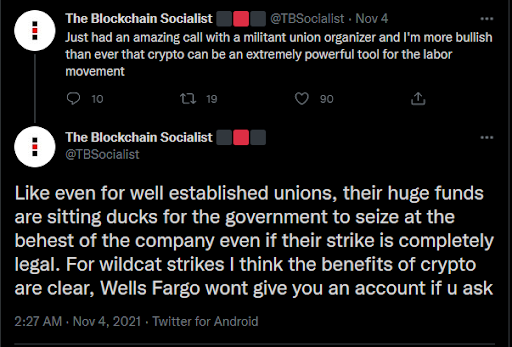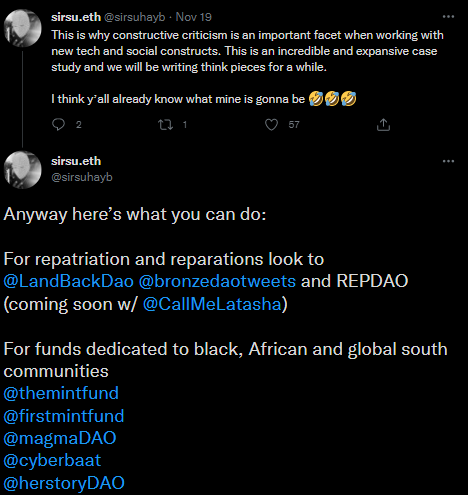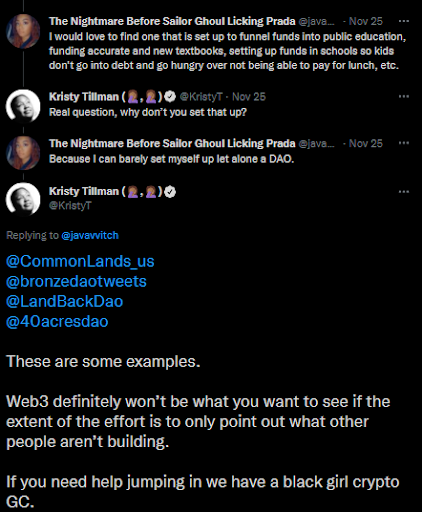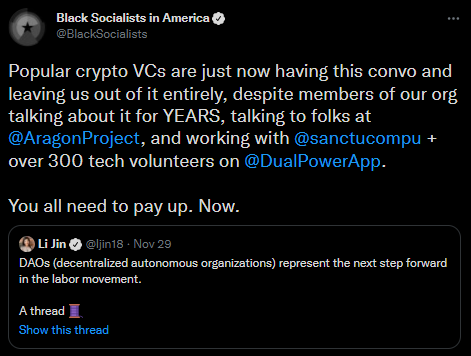This piece was co-authored with Jahed Momand and Frank Miroslav. Originally published by C4SS.
Quit your purity politics and pay attention to things outside of your camp or else you’ll get wrecked by a changing world and miss meaningful opportunities.
As such, one space I’ve been paying attention to is that of Decentralized Autonomous Organizations (DAOs). Despite the fact they often have relationships with Evil naughty bad boy things like speculative finance and artificial scarcity, DAOs have the potential to significantly impact the global economy over the next few decades.1 Even if you think that DeFi and crypto are horrible (and there are good reasons to feel that such as scams and carbon emissions), you should still be paying attention to them if only because they have a much greater likelihood of dramatically impacting the global economic system than, say, neo-Stalinism in our lifetime. A major reason is that despite the public association of cryptocurrencies with right-wing libertarians and/or finance bros, there are powerful innovations in governance and public goods allocation being written in the marginalia that should be of serious interest to anyone sincerely committed to helping others.
What the hell are you on about?
Before we hop in let’s define a few terms:
- Web3: A broad field, still being defined, but gesturing towards a decentralized internet where users control their data, interactions can be direct, and large corporations don’t mediate transactions. Worth noting there are lots of cool decentralized web projects that are not currencies such as the Indigenous lineage tool Āhau and the “gossip” protocol Secure-Scuttlebutt it was built on. Here’s a friend defining the terms and talking about some of his concerns and excitement in Web3 land especially re organizing, governance, and coordination problems.
- Blockchain: A decentralized ledger used to create consensus between who controls what assets in many (but not all) web3 projects but especially crypto-currencies.
- Ethereum: “Ethereum is the community-run technology powering the cryptocurrency ether (ETH) and thousands of decentralized applications.” Since its creation other applications have done what ETH does more cheaply (both in cost and environmental concerns) though ostensibly ETH is upgrading soonishly.
- Smart Contracts: Like vending machines made of code, which are automated and run on blockchains. Smart contracts are basically a set of rules, programmed on top of decentralized protocols such as the Ethereum token that execute actions given some conditions being met. This is part of the layer of “programmable money” that revolutionized crypto-currencies away from the static, boring, earth destroying, dinosaur proof of concept that is Bitcoin.
- DAO: Decentralized Autonomous Organizations, first seen on Ethereum, allow developers to create apps that let users interact with various protocols to create more complex economic and social technologies. These generally employ smart contracts. Some examples are things like lending pools where no one is going to check your credit score (because it’s over-collateralized and automated). Here’s a cool overview on what DAOs are. They describe them as such: “DAOs are Web3-native, and as such they tend to be organized according to the values of blockchain technology: openness, transparency, and decentralization. DAOs are an emergent model for facilitating and scaling human coordination in a way that gives members autonomy over their work and reduces issues related to bureaucratic gridlock.”
- Equity/Derivatives/Put/Long/Synthetics: Ehhhhhh, it’s just stonk stuff. Don’t worry about these financial instruments too much unless you really want to dive in. TradFi refers to the “traditional finance” world where these financial mechanisms emerged, as opposed to DeFi (decentralized finance) where many DAOs live now. There are various ways that DAOs make money for DeFi investors. Generally the protocols and smart contracts reward you for things like providing liquidity to the network; much like a bank does with small payments for letting them invest your money. Because web3 is very modular, the creative space for these DAOs to interact is much more complex than what is possible in TradFi.
Impact, purity, and money
One of the strongest critiques of anarchism (or consequentialism) I’ve heard (often from former anarchists no less) is that it’s too hard. And maybe it is. Hard problems don’t have Solutions in pure form. They have scales of tradeoffs and inventiveness at the margins. Your best hope with hard collective action problems is usually that prosocial tactics and incentive structures proliferate rapidly in a cascade of concurrent action. But at the end of the day, if you try to change anything in this fucked world, you will have dirty hands.
Take, for example, money. By interacting with money in any way you have touched capitalism and been sullied by the very association. After all, capitalist markets are inherently competitive and zero-sum, captured by elites, prone to inequality, used for exploitation and destruction, etc. Lefties responded to this with the Discourse moment of “there’s no ethical consumption under capitalism” as a challenge to vulgar individualist thinking that downplayed systemic approaches that proliferated through liberal feminist campaigns and greenwashing schemes (and that’s not even getting into more abstract concerns around the Value Form or debts being corruptions of promises by math and violence and the like).
But if you are anti-money and a purist about it, you can get into some sticky positions real quick.
Are you anti-‘direct cash based reparations’?
Are you anti-‘immigrants sending remittances to family back home’?
Assuming we’re all on the same page that, relative to our current political and economic moment, giving some money to a homeless person is not Inherently Ethically Bad™, then we can acknowledge some worthy uses of money in the real world.
Part of the issue here is the collapsing of scales of badness in how captured or compromised a given tactic is into the binary of Good versus Evil. Yes, capitalism is defined by captured markets and money/markets have some perverse incentives even if we got rid of all the overtly bad stuff. There may be alternative ways of organizing, but pretty much everything that people have suggested come with trade-offs. Given that we need to act, we should try to become comfortable with the complexity.
After all, funneling money to BIPoC and global south radical movements is Good and Pure effective altruism on a scale that would make Yudkowsky shudder in confusion. Maybe projects like Popcorn DAO aren’t quite that, but can possibly (and sometimes want to) be wrenched in that direction.
And what’s more, these same trade offs exist in all activism.
Is burning tires at a land defense barricade ideal for the environment? No.
Am I going to critique and nitpick native radicals fighting genocide, the destruction of their water supply, and ongoing dispossession for using the tools at hand? Hellllll no.
Does shutting down a road contribute to carbon emissions from idling engines? Yes.
Should we rule it out as a tactic in all cases? Probs not, my dudes.
Etc.
So sure, some tactics are more captured and fundamentally compromised than others (see: critiques of reformism) and we should distinguish them along these lines, but if you want to be pure, then changing things for the better shouldn’t be your goal. Interacting with complex systems necessarily means unintended negative externalities. The best you can do are honest debriefs and pivots as your tactics develop through testing, but at the end of the day all forms of activism are a gamble. Some cool kid nihilists often see this dynamic and kind of give up on complex systems modeling but that seems like a cop out to me, even if post-left critiques of ‘activism’ as a saviour infused ineffective concept are valid and important. You can’t dismantle the master’s house with the master’s tools, but you can still use them to absolutely wreck some shit in the best possible way.
DAOs and DeFi, are they good???
So everything is bad and some things are worse. Where does this leave us? Most recently I’ve been paying a lot of attention to the DeFi space as something that is clearly disruptive in some ways to capitalism as we know it (ie lower obstacles to entry for people outside of global metropoles to get flash loans because of over-collateralization), even as in many ways it replicates all of the very same financial mechanisms (bonding, derivatives, shorts, longs, put, etc).
Some examples of these are in the DAO space. DAO stands for Decentralized Autonomous Organization and is basically an app that automatically moves crypto-tokens around according to some rules for how it should be governed. In the most decentralized forms, these platforms are completely governed by the community of owners. Others assume some off-chain trust in a collective with keys to the treasury. Currently DAO voting is a contested zone in that often money = votes but there’s a range of projects such as conviction voting, quadratic voting, and others that articles like this one describe, alongside projects like Aragon for modularizing DAO governance. The DAO space is less ideologically rigid in my experience than right libertarians as well and ripe for some plug-and-play syndicalism and the like. In fact, a web3 developer co-op called dOrg has already formed and is the first DAO with an LLC.2 A member was recently interviewed by “The Blockchain Socialist” who has this to say about unions in DAOs:

Within this obviously capitalist and market-oriented system, are their windows for radicalism or at least harm reduction? To me this is an unequivocal yes (at least on the latter) as long as you don’t subscribe to hyper-campism and the original sin of proximity to libertarianism. Minimally, there are a lot of really cool BIPoC projects popping up.
Here are a couple tweets 3 mentioning a few of interest:

https://twitter.com/sirsuhayb/status/1461504054723584000?s=20

https://twitter.com/KristyT/status/1463582953968005120?s=20

https://twitter.com/BlackSocialists/status/1465425858835927044?s=20
(Worth noting that Black Socialists of America have always been consistent in their enactment of Black radical collective and co-op traditions/theory including in the web3 space. To the point of being ruthlessly attacked and slandered by tankies.)
Buying back and repatriating stolen African art? Funding Indigenous land back (a friend of mine is running a collective OHM wallet with a gnosis safe where they’ve agreed to redistribute the rewards to land back projects after a year)? Supporting BIPoC artist collectives? It takes a lot of gall to suggest all of these people are too stupid to realize how compromised their tactics are (though Twitter inevitably produces every possible bad take).
Beyond just these though, we also have other proofs of concept at play in projects like KlimaDAO that in less than a month has purchased over 10 million tons of carbon credits by adding a layer of speculative finance on top of the mission. There are plenty of critiques to be made of carbon markets on a dying planet but if you actually look at the credits transparently being bought by the KlimaDAO treasury (via Verra and the Toucan protocol), it’s supporting pretty cute stuff like hydroelectric dams in India and reforestation in South America. Additionally they address some of the critiques of carbon markets head-on in the docs and even more so in their discord.
Is it ironic for Klima to be sequestering carbon via what is essentially a carbon-producing redundantly decentralized database? Sure. Proof of stake produces carbon and proof of work is way more horrible. And at the same time, many investors are bullish on carbon credits as projects like Klima DAO dramatically raise the price as they hoover up the cheap credits. The fact that the technology and financial instruments surrounding Klima seem to be working as intended (aside from intense price collapse right now hahahahahah /cry) suggest the possibility of a wide range of creatively impactful projects grounded in climate science. And indeed, there are heaps of other supposedly carbon-negative blockchain projects including the new Mobile Coin created to synchronize with Signal Messenger as well as some fairly solarpunk stuff getting funded.
KlimaDAO is a fork of OlympusDAO (OHM) which is creating a decentralized reserve for the crypto ecosystem. I’d think the “abolish the fed” energy of this should be ancap catnip, but I’ve not even seen them significantly involved, surprisingly (and thankfully). Regardless of what ideologies might like the idea, if Olympus continues to work as advertised then it and projects like it could be disruptive to nation-state capitalism on an international scale. The most obvious reason is because many of the projects don’t require any proof of identity (much less citizenship!). This alone undermines the banking apartheid that is an aspect of global imperialism. Then on top of that, like the Robinhood trading app, these protocols (especially the ones off of expensive networks like Ethereum) allow people to make money off of small amounts of money but without the national identity verification. They function inherently as something of a natively international business in ways that corporations cannot. Even the core functioning of many of these projects is a kind of dual power that could dramatically change the relation of people to the states that govern them as parts are shown to be clearly inferior. I’ve not heard anyone in OlympusDAO say that they are trying to supersede the USD as the global reserve currency, but they might as well.
States will try to attack at every centralized choke point such as fiat onboarding and taxes they can if various cryptocurrency schemes become seriously threatening. The question is whether their efforts will work. Obviously central banks and regulatory agencies are extremely nervous, and likely to push back on permissionless systems for international cooperation involving competitive currencies (even as states and central banks create their own cryptocurrencies). But for the most part, they just weren’t designed for the scale of decentralization that typifies web3. Surprisingly, this paragraph at Foreign Policy sums it up nicely:
“the U.S. Food and Drug Administration was set up to regulate Merck and Pfizer, not 1 million biohackers; the Federal Aviation Administration was built for Boeing and Airbus, not 1 million drone hobbyists; and the U.S. Securities and Exchange Commission was created to go after Goldman Sachs and Morgan Stanley, not 1 million Web3 developers.”
In contrast to this systemic failure mode, in web3, there is often a degree of both lawless freedom and collective accountability that is possible through democratic protocols.
Our imagination shouldn’t stop there though. What if you could get paid to give money directly to campesinos (Indigenous subsistence farmers) stewarding and protecting sacred land from extractive and imperialist multi-nationals? Feels weird, but it would be cool right? This is kind of what projects like Kolektivo DAO are already doing.
There’s a broader point here about incentives, a domain that most leftists give unfortunately little thought to outside of big old texts. Some of this might be an understandable reaction against those who think you can just theorycraft how a future world would look like and some might be a defensive ploy to muddy the waters against critiques about intra-left abuses. Regardless, there’s the basic point that incentives matter in the when it comes to trying to build the world we want (or when we’re just trying to stop the one we have from sliding into apocalypse).
With programmable money and smart-contracts you can, to some extent, just create game theoretically cooperative incentives in the here and now in the ways that authoritarian-communists think The New Socialist Man would’ve (but somehow never does) or that capitalism grinds into the pavement. Capitalism dgaf about the environmental commons and Ostromian analyses faces serious scaling problems when we try to apply it to global commons without local trust building. But what if in person trust wasn’t required to scale the wicked problem of global stewardship? I’m not saying that DAOs fix this (particularly on their own), but there are many that are doing interesting innovations in that domain.
A handful of projects are now focusing on these innovations in stewardship from an Ostromian point of view, even going so far as adopting Ostrom’s Institutional Analysis and Development (IAD) wholly into the goals of their projects. GitcoinDAO, The CommonsStack, Token Engineering Commons, 1Hive, and PrimeDAO are working to build tools to enable cooperation across DAOs and protocols. All of them are ostensibly, in their outward-facing messaging and their daily practice, collectively governed projects that are trying to build open-source, freely available tools and components for cooperative economies to scale themselves on blockchains. While there is a move within the blockchain space overall toward “progressive dictatorships,” where companies and protocols start as strongly founder-led, both in their product vision and in their ownership, projects like 1Hive aim to show that starting community-first is viable, even as far as coining product-community fit vs. product-market fit. GitcoinDAO has put $40M into the open-source community using quadratic voting to let people better express their preferences. And this isn’t another charity—they’re using these grants to fund projects that build open-source components that then feed right back into the economy created by Gitcoin, with the ultimate goal of building and funding sustainable public goods. Solidarity not charity.
It’s clear that there’s a very strong undercurrent trying to push speculative finance toward sustainable public goods that most people can participate in and benefit from. The CommonsStack kind of leads the way here—they’re incorporated in Switzerland as a foundation to limit liability on their participants, and you can join for as little as $425 (paid in DAI), or you can take on tasks and work your way in. They’re strictly structured to limit some of the worst accumulative behaviors of speculative finance.
There’s a case to be made (primarily by Marxists) that speculative finance is inherently bad. And sure, anyone with access to the internet could verify the extent to which our world is being fucked by the purely self-interested gambling of ultra-wealthy (though this critique ignores the evidence of the history of actually-existing-capitalism, as well as the history of actually-existing markets that have operated in stateless societies). But even if DeFi inherits the logics of TradFi in many respects, there’s a pretty big gap between giving your friend some wood so that they can build a swing you will both benefit from and the US stock exchange.4
There’s also the value of lived experience, both in terms of exposing people to new possibilities and imparting the necessary experience to embody alternative ways of life. One of the most unfortunate things about the mass socialist movements of the 19th and early 20th century was the failure to promote alternate ways of doing things in the here and now (encouraged by a vision that saw social change as coming from good socialists seizing mass centralized industry through either electoral or revolutionary means). A big problem with a model of social change that posits major breaks between radically different ways of doing things is that people (even radicals) really underestimate just how complex our existing world is and how much we get by on accumulated “common sense.” Building parts of the new world in the shell of the world lets us trace out potential failure modes and generate new common sense that can help avoid the worst of the disorientation should significant change at scale happen.
Furthermore, actual lived experience or exposure to alternatives is for the majority of people the most persuasive argument for why they should consider a different world, to say nothing of fighting for it. And this isn’t just speculation (haha). For example, the class of people most likely to be radical anticapitalists until the late 19th century was not the dispossessed mass worker, but rather skilled/deskilled artisans who were pushing back against the threats against their autonomy. Give people something concrete and useful that they can experience, work toward, or protect, not promises about a better future premised on abstract arguments.
Taking Risks
Cryptocurrency, DAOs, and the like aren’t inherently radical in my opinion and they aren’t direct action (though they do seem to sometimes get the goods). Like other tactics, they’re just tools. Protests can be used for extremely asinine things like COVID-19 denialism or for awesome things like ousting corrupt authoritarian regimes or getting Indigenous land back. It just depends on the context and application. These new forms of tech are going to continue to disrupt or reinforce the various institutions that are clearly not capable of handling the various problems and existential risks we all face.
DeFi is inherently risky. Speculative finance is gambling and there are a lot of hucksters out there. I have no doubt that there are many crypto bubbles overdue to burst even alongside many other crypto projects likely to explode in utility and value over the next decade. But with all that said, if there’s a pathway that a collective of sex workers or activists or marginalized freelance artists can share a savings pool with 150% APY (annual percentage yield, ie your bank giving you .06% bonus for letting them use your money) and relatively low risk yields then it makes sense to at least be curious. Even better when most of these projects are completely open source, heavily independently audited, and feature built-in bug bounties.
Ancaps, fascists, and right-wing libertarians will continue to get crypto rich (and waste money on various ponzi scams), while also developing out their infrastructure and influence in these spaces regardless of whether anticapitalists, queers, BIPoC, and other marignalized people start asserting their presence in the often pepe the frog flavoured environs. Personally, if there’s a .00001% chance all my rad friends can retire and devote their lives to the meaningful work I know they’d do while also supporting emergent tech that can be crowbarred towards more radical ends, then minimally I’m all 


There’s also the seriously unappreciated potential of public goods funding. The mid-century social democratic welfare state did legitimately improve things for a lot of people. But it had serious flaws, most notably that it was fundamentally tied to the mechanisms of a nation-state that had to generate tax revenue by strengthening capitalism and also created a single point of failure that was easy to attack. Public goods financed and coordinated using the blockchain are far less liable to such problems. Projects like Protocol Labs and IPFS are working on public infrastructure to combat AWS etc. Moreover the relative lack of innovation in this area (because it’s been tied to the state as more decentralized forms of mutual aid dried up) potentially means there’s a lot of low-hanging fruit now that things like computing or homebrew manufacturing have become significantly cheaper. There’s also significant resources that could be employed here (see how for his 2016 campaign Bernie Sanders raised $200,000,000). That might not sound like much when compared to what the United States and other governments spend on welfare, but if I’m right about the low-hanging fruit being unpicked, millions directed by a polycentric network of autonomous organizations (as done currently by projects like the incredible Open Collective that are currently charting an ‘exit to community’) can get a lot more done than big government bureaucracies that have billions behind them. 5
The future of DAOs will probably not be inherently good. They’re part of a wave of super-empowerment tech that could have universal appeal to both the goodies and the baddies and there’s no way to stop the baddies from leveraging it as well. Sure there are VC wealth transfer pump and dump scams6 and nazi fundraisers but you don’t try to abolish books because there are terrible ones. Instead you try to leverage what you can for the good. The train has left the station and we can’t go in reverse. As my friend Jahed said, “You either participate and bend the will of this thing in your direction, or you literally remove your own agency and become a non-playable character. There’s no reason to make yourself an NPC.” Obviously this domain is not accessible or desirable to everyone, but even if you think that crypto is the latest stage of late stage capitalism there’s still a point to actually understanding how it works so you can do more than just mindlessly react to it.
None of us like capitalism but there are liberatory collective points of pressure, illegibility and mechanisms of circumvention within systems of exchange that marginalized trade cultures and others have always utilized. I know I’m not going to convince nihilist anti-civ insurrectos with these diatribes (although given how many post on Twitter maybe they’ll come around and cheers to a potential Abolish Civilization DAO), but I’m hoping that tech-friendly leftists, anarchists, solarpunks, mutualists, co-ops, collectives, organizing spaces, and communities that have historically often been early adopters of new tech such as sex workers, consider it more deeply.
There may be no ethical activism under capitalism, but you should probably still try.
- Some friends and I had an interesting conversation about scarcity in DeFi wherein a lot of the defi web3 world is about financialization in ways that are inherently scarce (ie NFTs) as opposed to the relative abundance of say, the p2p torrenting era. I argue that scarcity in financial mechanisms is often necessary to solving for need allocation at scale but it’s worth noting that the dynamics of extraction, rent seeking, inequality etc that capitalism is prone to can be recreated in these domains unless efforts are made to support the more centrifugal and communal tendencies in decentralized markets. More theory is needed around the extent to which DeFi and DAOs could abolish extractive renter classes or whether they just mean your boss is a computer and you owe them money. Here are some jokes about NFT scarcity
- DisCo Co-Op identifies as an alternative to DAOs.
- Here are two more posts with neat folks in the space. https://twitter.com/psruano/status/1470469405737893891?s=20 and https://twitter.com/psruano/status/1470469518510206982?s=20
- This gets a deeper divide that reflects fundamental differences between anarchist and Marxist theories of how capitalism arises and is maintained that we don’t have the space to get into. Nevertheless, it’s worth noting just how fundamental investment dynamics are to push back against sweeping statements about how particular forms of organization are bad or dangerous. For example even in a neo-Stalinist utopia there is no way that all forms of speculative finance could possibly be stopped. Black markets would emerge around literally anything that can be moved (as they literally always do under Actually Existing Communism). Say everyone is born with rights to a 1/(total population of nation)% ownership of the steel produced by said nation. Should cyborg-brain-in-a-vat-Marx ban people from saying “Hey if you give me some o’ that good steel ya got there i will make a bicycle machine and give you three bikes for your family”. I should hope not! Hate entrepreneurship all you want but it’s pretty hard to get rid of these underlying incentive dynamics.
- Indeed there’s a delicious possibility if crypto does result in serious innovation in public goods funding and governance that we’ll see a significant shift in terms of ideological association in the public eye away from libertarians and fascists and towards leftists simply because payment tech has seen quite a lot of innovation, whereas public goods hasn’t and as such leftists have far more reason to be really excited about it. If this happens, I won’t brag about calling it. Much.
- Worth noting the extreme bias of the person they brought on to make this point though.
- I am extremely not a financial advisor and none of this should be considered financial advice. It’s just for entertainment purposes. However, here is a guide by my friend about how to balance risk and diversify in crypto as well as some useful general thoughts on how to think about the whole ecosystem. Also here is a guide to getting into the Olympus (OHM) DAO ecosystem (including Klima). Also worth mentioning, I usually imagine my target audience in my writing as leftists and anarchists who would hate my guts for having so many shared values and yet saying such blasphemous things. However, I’ve also noticed that left-libertarians/mutualists/freed market anarchists/etc seem to not be very involved or interested in this space (or entrepreneurship for that matter) which seems weird but I guess y’all are sometimes broke theory paralysis prone academics
. Thanks to Jahed Momand for coming through with support for the section on public goods, Frank Miroslav for adding heaps, and a bunch of nerdy friends that’ve been puzzling this through with me and helped strengthen the work immensely.

